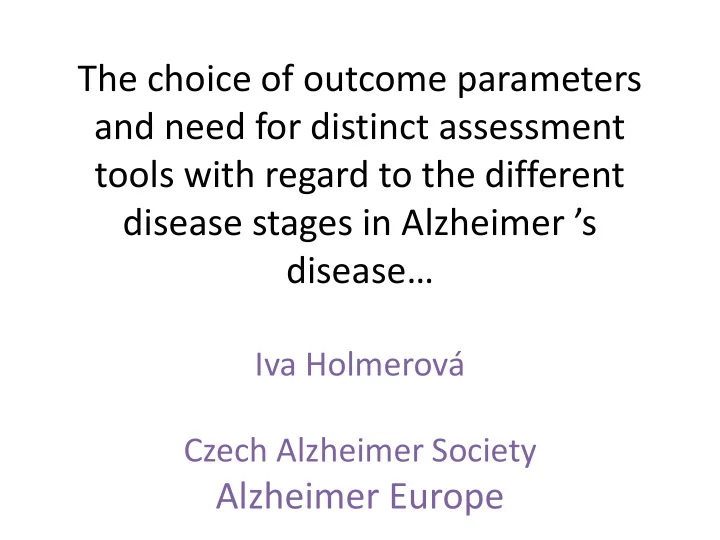

The choice of outcome parameters and need for distinct assessment tools with regard to the different disease stages in Alzheimer ’s disease… Iva Holmerová Czech Alzheimer Society Alzheimer Europe
Patient organisation view Czech Alzheimer Society Alzheimer Europe
Czech Republic (since 1993) • Population 10,5 mil. (6 % foreigners) • Life Expectancy (males 75,2, females 81,1) • Unemployment 7,4 % (end of July 2014) • Economic growth 2,7% (2nd Q of 2014) • Spending on health (7,5% of GDP) • 140 ths. persons living with dementia
OSKAR FISCHER 1876- 1942 (Slaný - KZ Teresienstadt) Worked in the Department of Pathology, Psychiatric Department, Charles University in Prague 1907 – pathological findings in 12 cases of „senile“dementia and 16 Oskar Fischer, 1876 - 1942 controls
Oskar Fischer´s article
Disease burden H.Brodaty (Paris Alzheimer, 2008): - 19th century – infections - 20th century – cardiovascular and oncological diseases - 21st century – neurodegeneration And yet: 1/20 of research support compared to oncological or cardiovascular diseases
DEMENTIA- Research focus on: • Primary prevention • Disease modification Pre-clinical stages: GAP between the precise diagnosis and no causal or d.m. therapy Drug trials – hope to those (brave) who decide to know more Ethical considerations (surveillance) and research, culture, anthropology… • Symptomatic improvement • „Stand alone“ (?) symptoms (agitation, agression…)
ABC - Dementia syndrome • Activities of Daily Living • BPSD • Cognition
Strategy P-PA-IA – acronym of three stages and changing needs of PwD (strategy of the Czech Alzheimer Society) 1 (P) 2 (PA) 3 (IA) stadium Psychology potřeby Individualizovaná Support asistence Counselling Diagnosis Meaningul activities Disclosure Care Therapy Support Individualized Legal issues Caregivers approach Supervision Nursing care Nefarmakologické metody Palliative care Paliativní péče
Complexity of the dementia syndrome • Life history, experience, • Values, priorities • Current tasks of life • Disease pathology (proteins – A-beta, tau) • Localisation of pathology • Different leading symptoms – h.memory, visuospatial, verbal, frontal … • Progression of the disease • Environment and support, people around us, complexity of the external and changing world • Different cultures…. • „psychosocial context“ and interventions
Dementia stage of AD research focus: • Cognitive endpoint (objective tests) • Functional endpoint (IADLs) • Global endpoint (global assessment) • …… other? – separate and integrated • BPSD as „stand alone“ • ??? – resistiveness to care (Volicer)
Psychosocial interventions Positive effects are demonstrated on patient • cognition (Olazaran et al.,2010) • behaviour (Olazaran et al.,2010) • family carer mood (Vernooij-Dassen, Draskovic, et al., 2011) • they reduce costs by delaying institutionalization (Spijker et al., 2008). (Vernooij -Dassen & Moniz-Cook, 2014)
Clinical „pictures“ - complexity • Different types of dementia • Different manifestations of Alzheimer´s disease • Variability: personality, context and conditions, disease progression…. • Do we need mor appropriate and detailed descriptions of „clinical pictures“ of dementia? Follow up along the progression trajectory? • Dementia as a „novel“ syndrome (20th century…) • God is in the detail (A.Warburg) • Morelli case in art (C. Ginzburg)
Suggestions: • Ethical considerations – on a higher level than currently • Anthropological issues/cultural differences • Social aspects – stigma, occupation, insurance… • Effects of psychosocial aspects and interventions • Context of life, care and therapy… Should be considered also in drug trials Is it possible to separate drug, clinical and psychosocial research on dementia?
CELLO - Centrum pro studium dlouhověkosti a dlouhodobé péče Fakulta humanitních studií Univerzity Karlovy Gerontologické centrum 18200 Praha 8 – Kobylisy Šimůnkova 1600 email: iva.holmerova@gerontocentrum.cz www.cello-ilc.cz
Recommend
More recommend